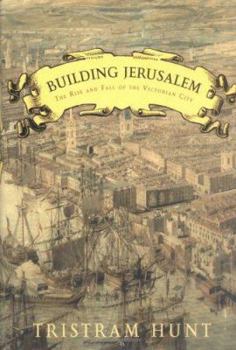Building Jerusalem: The Rise and Fall of the Victorian City
Select Format
Select Condition 
Book Overview
From Manchester's deadly cotton works to London's literary salons, a brilliant exploration of how the Victorians created the modern city Since Charles Dickens first described Coketown in "Hard Times," the nineteenth-century city, born of the industrial revolution, has been a byword for deprivation, pollution, and criminality. Yet, as historian Tristram Hunt argues in this powerful new history, the Coketowns of the 1800s were far more than a monstrous landscape of factories and tenements. By 1851, more than half of Britain's population lived in cities, and even as these pioneers confronted a frightening new way of life, they produced an urban flowering that would influence the shape of cities for generations to come. Drawing on diaries, newspapers, and classic works of fiction, Hunt shows how the Victorians translated their energy and ambition into realizing an astonishingly grand vision of the utopian city on a hill--the new Jerusalem. He surveys the great civic creations, from town halls to city squares, sidewalks, and even sewers, to reveal a story of middle-class power and prosperity and the liberating mission of city life. Vowing to emulate the city-states of Renaissance Italy, the Victorians worked to turn even the smokestacks of Manchester and Birmingham into sites of freedom and art. And they succeeded--until twentieth-century decline transformed wealthy metropolises into dangerous inner cities. An original history of proud cities and confident citizens, "Building Jerusalem" depicts an unrivaled era that produced one of the great urban civilizations of Western history.
Format:Hardcover
Language:English
ISBN:0805080260
ISBN13:9780805080261
Release Date:December 2005
Publisher:Metropolitan Books
Length:576 Pages
Weight:2.30 lbs.
Dimensions:1.9" x 6.5" x 9.5"
Customer Reviews
2 ratings
Transforming England's "Dark Satanic Mills"
Published by Thriftbooks.com User , 19 years ago
Britain was the first country on Earth to witness the Industrial Revolution -- and my, oh, my was it ugly! Millions of economically displaced families moved from the countryside and Ireland to work in the burgeoning cotton, metal and coal industries during the early 19th century. Cities like Manchester, Birmingham and Leeds were completely overwhelmed by the human influx, becoming breeding places for mass poverty and the disease that followed. The living conditions were nothing less than murderous -- as bad as anything in the Third World today. In this college-level book, Tristram Hunt chronicles how British society responded to the crisis. "Building Jerusalem" is an intellectual history of the ideas that transformed squalor-bound urban areas into a new organizational model based on civic pride and public works. We learn how the Romantic vision of medieval chivalry (as retold in popular novels like "Ivanhoe") influenced the ground-level urban activists -- along with powerful forms of Christian compassion and nationalism. The Victorian urban reform movement succeeded in many areas, but fell short in others. Ultimately, the coming of the 20th century undermined many of the core ideas that sustained the movement and led to a new focus on suburban development instead. Hunt's writing is lively, particularly in the first 200 pages, and his research is impeccable. Unfortunately, the second half of the book drags a bit as he delves too deeply into the biographies of certain key characters, like John Ruskin. I would have split this book into two different volumes, the first from 1770 to about 1880, the second volume from 1880 to 2000. The photos are valuable, but we need more maps, illustrations and graphics to understand the true nature of this earth-shaking transformation. Bottom line: Worth reading, but could be better organized.
Extraordinary!!!!!!!
Published by Thriftbooks.com User , 19 years ago
Historians must take an ideological stance or they become but poor reporters of facts. Hunt's research and approach is brilliant. Whether you agree with him on his interpretation of the facts is your business. Great history is written with great passion. This book is a very fine example of the rare art of the historian.






